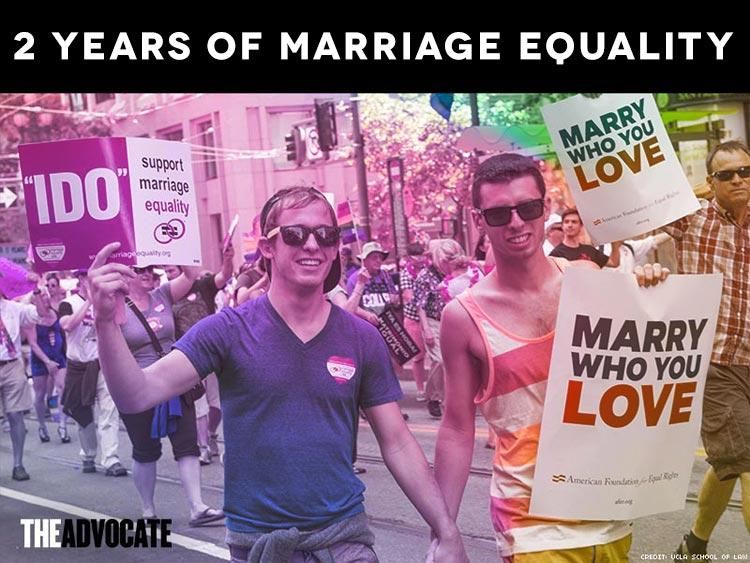Gus Kenworthy Receives the HRC Visibility Award

Olympic skier Gus Kenworthy talks about the importance of being out at the 2017 HRC Utah Gala.
Gus Kenworthy Receives the HRC Visibility Award

Olympic skier Gus Kenworthy talks about the importance of being out at the 2017 HRC Utah Gala.
Donald Trump Jr. Further Victimizes Amber Heard to Get Back at Johnny Depp

Johnny Depp threatened Donald Trump. Naturally, Trump Jr. further victimized Depp’s ex.
Milo Yiannopoulos’s Book Party Moved After Being Booked as Gay Pride Event

The venue’s owner discovered that the event was not a Pride celebration but rather a release of Dangerous, the alt-right provocateur’s self-published book.
22 Million People Lose Healthcare Under Senate Trumpcare Bill: CBO

The Congressional Budget Office (CBO) released its report on the Senate Republicans’ bill to repeal and replace Obamacare and the results are grim.
The Hill reports that four million people would lose employer-provided insurance coverage in 2018 under the bill, but that’s not all:
The number of people losing employer-provided coverage under the Senate’s legislation is an increase from the bill passed by the House last month. The CBO in May assessed that 2 million people would lose employer-provided coverage in 2018 under the House legislation.
Looking more broadly at the insurance market, CBO projected that 15 million more people would become uninsured next year under the Senate bill, with a total of 22 million people becoming insured over the next 10 years.
The CBO found that the bill would result in a $321 billion deficit reduction over 10 years.
The White House released a statement on the report:
The CBO has consistently proven it cannot accurately predict how healthcare legislation will impact insurance coverage. This history of inaccuracy, as demonstrated by its flawed report on coverage, premiums, and predicted deficit arising out of Obamacare, reminds us that its analysis must not be trusted blindly. In 2013, the CBO estimated that 24 million people would have coverage under Obamacare by 2016. It was off by an astounding 13 million people – more than half—as less than 11 million were actually covered. Then, CBO estimated that 30 million fewer people would be uninsured in 2016, but then it had to reduce its estimate to 22 million, further illustrating its inability to present reliable healthcare predictions.
We know the facts. To date, we have seen average individual market premiums more than double and insurers across the country opting out of healthcare exchanges. As more and more people continue to lose coverage and face fewer healthcare choices, President Trump is committed to repealing and replacing Obamacare, which has failed the American people for far too long.
The post 22 Million People Lose Healthcare Under Senate Trumpcare Bill: CBO appeared first on Towleroad.
22 Million People Lose Healthcare Under Senate Trumpcare Bill: CBO
Why June 26 Is a Momentous Day for LGBT Equality

With today’s Arkansas ruling, there have now been five pro-equality Supreme Court decisions issued on this date.
www.advocate.com/politics/2017/6/26/why-june-26-momentous-day-lgbt-equality
Neil Gorsuch Isn’t Conservative. He’s Reactionary.

Today, the Supreme Court issued a per curiam ruling that solidified its landmark same-sex marriage ruling in Obergefell v. Hodges. Contrary to popular belief, per curiam doesn’t mean “unanimous”; it means “by the court,” or that it is unsigned. Indeed, three justices did dissent: Justices Clarence Thomas and Samuel Alito, and the Court’s newest member (who doesn’t belong there in the first place), Neil Gorsuch. In his dissent, Gorsuch proves he’s everything we feared he would be, an anti-queer wolf with a sneaky, homespun smile.
First, the decision itself. This case, Pavan v. Smith, was triggered by the State of Arkansas’s refusal to list the names of married same-sex couples on their children’s birth certificates. Recall that in Obergefell, Justice Kennedy wrote for Supreme Court’s majority that the Fourteenth Amendment’s due process and equal protection guarantees required states to extend marriage rights to same-sex couples. Queer couples deserved equal “dignity,” Kennedy wrote, ending his decision with this profound statement on marriage and equality:

Arkansas had tried to neuter this holding, arguing that nothing in a decision that guarantees queer persons the right to marry also gives them the right to both be listed as parents to a child where only one of them is a biological parent.
There are three problems with that argument. First, it makes a mockery of Obergefell. That decision required states to extend all the “constellation of” rights and obligations that come with marriage to queer couples “on the same terms and conditions as opposite-sex couples.” Parentage is one of those rights.
Second, as the Court noted, Arkansas already includes nonbiological parents on birth certificates when the parents are in opposite-sex marriages. Children born via artificial insemination to opposite-sex couples get their biological mom’s name and her husband’s name on their birth certificate. This is actually state law, and it even applies when everyone knows that the husband is not the biological father.
Third, any other holding would make marriage rights narrow and open the door to erosion of the rights associated with marriage. If queer persons can get married, but then they can’t enjoy the rights that come with a valid marriage, what was the point in the first place?
But these arguments didn’t move Justice Gorsuch, who took Arkansas’s line and argued that a decision about marriage says nothing about a state administrative regime based on biology. As I noted earlier, this runs directly afoul of Obergefell, which guaranteed more than a certificate of marriage, but also all the rights associated with marriage. Combine this with Gorsuch’s radical dissent in the Court’s refusal to take up a challenge to California’s law that only grants gun owners concealed carry permits for “particularized need.” Only Gorsuch and Thomas dissented, arguing that the law infringes some nonexistent right to carry guns everywhere and for whatever reason, something not even the most conservative Supreme Court justices have even implied before.
Gorsuch’s emerging jurisprudence is an affront to progressive values and a direct assault on our rights and safety as queer Americans.
The post Neil Gorsuch Isn’t Conservative. He’s Reactionary. appeared first on Towleroad.
Taking Stock of Marriage Equality Progress Around the World

As we celebrate two years of nationwide marriage equality here in the U.S., this is a good opportunity to take stock of marriage equality progress around the world.
There are currently 21 countries, including the U.S., that have full marriage equality. Another two countries – Mexico and the United Kingdom – have partial marriage equality. With the exception of South Africa and Taiwan, all countries with marriage equality are located in Europe and the Americas.
The most recent marriage equality victory was in Taiwan. Only weeks ago, Taiwan’s Constitutional Court issued a ruling in favor of marriage equality, paving the way for it to be the first place in Asia to achieve such a victory. The British Overseas Territory of Bermuda also achieved marriage equality last month through a ruling of the country’s top court. And, earlier this year, Finland began allowing same-sex marriages to proceed, two years after the relevant legislation was passed.
Looking forward, marriage equality is on the horizon in many places such as Australia, Chile, and Malta. Marriage equality efforts continue to move ahead in Australia despite the conservative government’s inability to allow a winning vote in parliament. In Chile, President Michelle Bachelet took the first steps towards marriage equality earlier this year. And, just last week, Malta’s newly elected government pledged to push the issue forward – quickly.
As we celebrate the anniversary of marriage equality today in the U.S., we recognize our work is not done until LGBTQ people – wherever they live – are guaranteed full civil rights and equality, including the right to marry whom they love regardless of sexual orientation or gender. HRC remains committed to achieving marriage equality and we look forward to working with activists around the world to achieve it.
To learn more HRC’s work to advance LGBTQ equality around the globe, click here.